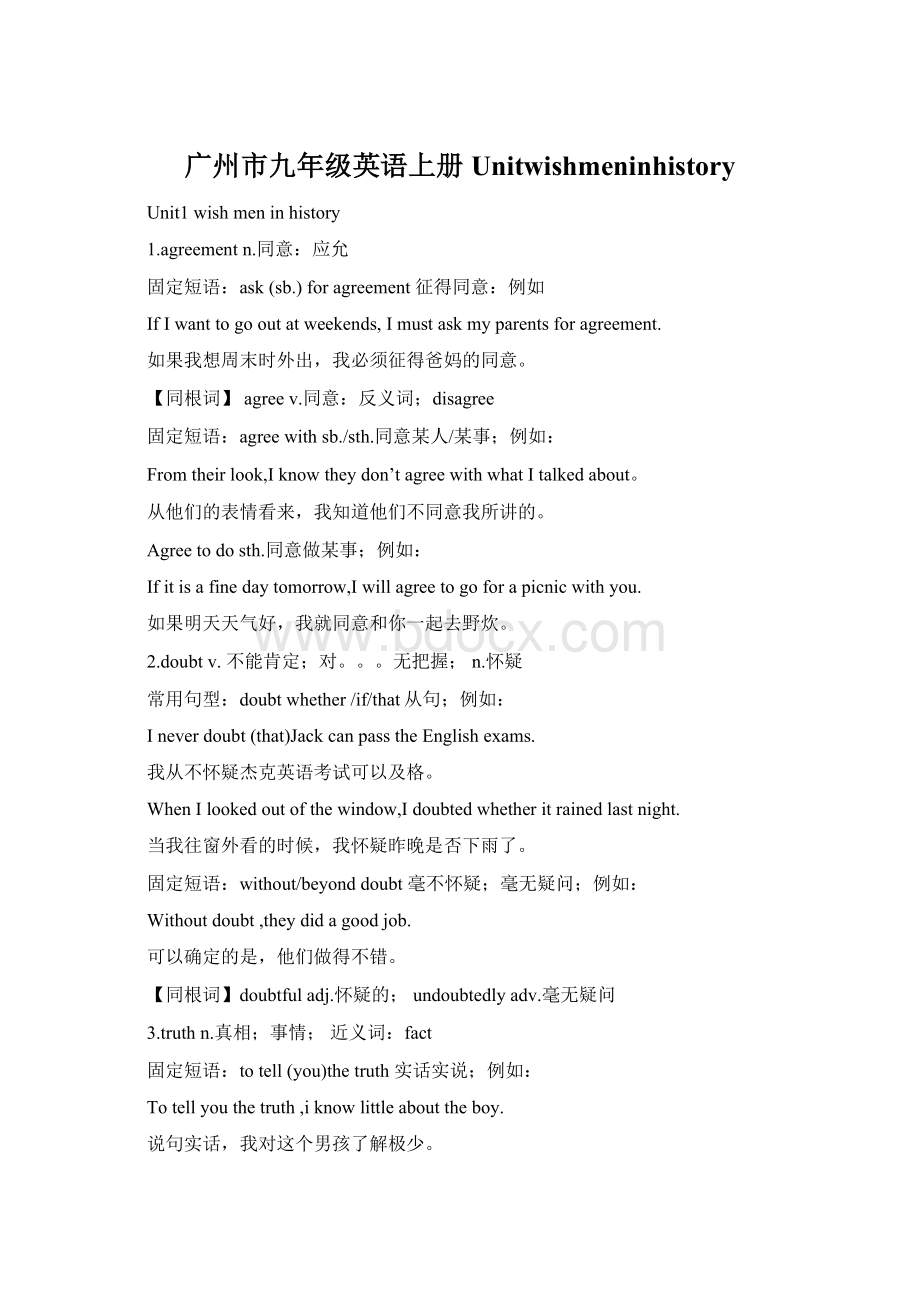广州市九年级英语上册Unitwishmeninhistory.docx
《广州市九年级英语上册Unitwishmeninhistory.docx》由会员分享,可在线阅读,更多相关《广州市九年级英语上册Unitwishmeninhistory.docx(10页珍藏版)》请在冰豆网上搜索。

广州市九年级英语上册Unitwishmeninhistory
Unit1wishmeninhistory
1.agreementn.同意:
应允
固定短语:
ask(sb.)foragreement征得同意:
例如
IfIwanttogooutatweekends,Imustaskmyparentsforagreement.
如果我想周末时外出,我必须征得爸妈的同意。
【同根词】agreev.同意:
反义词;disagree
固定短语:
agreewithsb./sth.同意某人/某事;例如:
Fromtheirlook,Iknowtheydon’tagreewithwhatItalkedabout。
从他们的表情看来,我知道他们不同意我所讲的。
Agreetodosth.同意做某事;例如:
Ifitisafinedaytomorrow,Iwillagreetogoforapicnicwithyou.
如果明天天气好,我就同意和你一起去野炊。
2.doubtv.不能肯定;对。
。
。
无把握;n.怀疑
常用句型:
doubtwhether/if/that从句;例如:
Ineverdoubt(that)JackcanpasstheEnglishexams.
我从不怀疑杰克英语考试可以及格。
WhenIlookedoutofthewindow,Idoubtedwhetheritrainedlastnight.
当我往窗外看的时候,我怀疑昨晚是否下雨了。
固定短语:
without/beyonddoubt毫不怀疑;毫无疑问;例如:
Withoutdoubt,theydidagoodjob.
可以确定的是,他们做得不错。
【同根词】doubtfuladj.怀疑的;undoubtedlyadv.毫无疑问
3.truthn.真相;事情;近义词:
fact
固定短语:
totell(you)thetruth实话实说;例如:
Totellyouthetruth,iknowlittleabouttheboy.
说句实话,我对这个男孩了解极少。
【同根词】trueadj.真的,正确的;trulyadv.真正地;确实;真诚地
辨析true与real
Real侧重真实存在,与“无”相对;true侧重于事实,实际情况相符,与“假”相对;true还可以相当于right“对的。
正确的”的意思;true与real有时可以替换,表示物体是真的,而非伪造的。
例如:
TheAfricanghostfishisnotreal.
非洲幽灵鱼是不存在的。
Thestoryisnottrue
这个故事与事实不符。
IagreewithLindabecausewhatshesaidistrue.
我支持琳达因为她说的是对的。
4.seemv.似乎,好像
固定短语:
seemtodosth.似乎,好像做某事;例如:
Heseemstobeill.
他好像生病了。
常用句型:
Itseemsthat从句;例如:
Itseemsthatheisill.
好像他生病了。
近义词:
appear;与be,feel,become,get,fall,come,go等词一样,seem也可做系动词,后面可接形容词,构成系表结构。
例如:
Sarahdoesn’tcometoschool.Sheseemssick.
莎拉没来学校。
她好像生病了。
5.certainadj.确定的;肯定的
固定短语1:
becertainof/about...对。
。
。
是肯定的;例如:
Aliceisquitecertainaboutheranswer.
爱丽丝对自己的答案很有把握。
固定短语2:
toacertaindegree在某种程度上(=inaway=partly);例如:
Toacertaindegree,theaccidentgetsustorealizetheimportanceofsafety.
在某种程度上,这次事故让我们意识到安全的重要性。
【同根词】certainlyadv.无疑;当然(=ofcourse)
常用句型:
becertainthat/who/where...+从句;例如:
Iamnotcertainwhereheisfrom.
我不确定他是哪里人。
近义词:
sure
6.Correctadj.正确的;准确无误的;v.改正(=make...correct/right);批改近义词;right;例如:
Doyouhavethecorrecttime?
你的表是准的吧?
Don’tbeworried.Thereisenoughtimeandyoucancorrectthemistakes.
别担心。
还有充足的时间,你可以把错误改过来。
【同根词】correctlyadv.正确地;correctnessn.正确;correctionn.改正,纠正
7.fill...with...用。
。
。
把。
。
。
装满
Jackie,helpfillthecupwithwater.
杰基,帮忙把杯子装满水。
固定短语:
befilledwith充满;装满(=befullof);例如:
Yourroomisfilledwithdust.Let’scleanitup.
房间里很多灰尘。
我们一起把房间打扫干净吧。
8.send...toprison把。
。
。
关进监狱
该短语中的名词prison前面用零冠词,类似的词有hospital,school,church等,注意以下两句话的区别。
例如:
Amywasbadlyhurtinanaccidentandshewassenttohospitalatonce.Todaysomeofherfriendsdecidetogotothehospitalandseeher.
艾米在一起事故中受了重伤,很快她被送往医院。
今天她的一些朋友决定去医院看望她。
近义词组:
send...tojail
巩固习题
一·根据要求完成词汇。
1.agree(名词)Real(副词)
2.Seem(近义词)True(名词)
3.Gold(形容词)Race(现在分词)
4.Mistake(近义词)Fill(过去分词)
二·从下面每个小题的A,B,C三个选项中选出可以替换划线部分的最佳选项。
()1。
--whydoyoulookworried?
--Idoubtwhetherwecangoforapicnictomorrow.
A.wanttoknowB.becomeangryC.feelunsure
()2.--Idon’tknowtheboytoldyouthetruthjustnow.
--Maybe.Iknowheoftenliestoothers.
A.factB.opinionC.idea
()3.--AreyoucertaintheGreensareonholiday?
--Ofcourse.Theyaskedmetotakecareoftheirpetdog.
A.happyB.sureC.angry
()4.--Luckily,alltheanswerwerecorrectandIwonthefirstprizeatlast.
--Congratulationstoyou,Cindy!
A.wrongB.rightC.interesting
()5.--Look!
Almosteverybusisfilledwithpassengers.
--Duringholidays,takingbusesoutisthemostpopularway.
A.FullofB.InterestedinC.worriedabout
3.根据句子意思,从下面每小题的A,B,C三个选项中选出恰当的词语完成句子。
()1.Anisanarrangement,apromiseoracontractmadewithsomebody.
A.agreementB.AdvertisementC.announcement
()2.Aisacontainermadeofglass,clayorplastic,usedforstoringfoodin.
A.bowlB.basketC.pot
()3.Aisadeeprounddishwithawideopentop,usuallyusedforholdingfoodorliquid.
A.bowlB.potC.basket
()4.Aisabuildinginwhichpeoplearekeptasapunishmentfordoingsomethingagainstthelaw.
A.prisonB.museumC.hotel
()5.--Whatdoyouthinkofmyspeech?
--Verygreat!
Besides,fromtheteachers’smile,theymustit.
A.beangryatB.bestrictaboutC.behappywith
()6.--Sweetie,walkslowlyorthewaterinthecupwill
--Ok,Iwill.
A.runoverB.actoutC.dryup
第2课时课文重难点句型讲解
1.OnedayinancientGreece,KingHieroaskedacrownmakehimagoldencrown.Atfirst,hewasveryhappywithit.
在古希腊,有一天希伦国王要求制作王冠的工匠为他打造一顶金冠。
一开始,他十分满意。
Oneday在这里是“过去某天”的意思,句子应该用一般过去时。
此外,oneday相当于someday,表示“将来某天”句子跟一般将来时连用。
例如:
Oneday,Ipickedupawalletonmymywayhome.
有一天,在回家的路上我拾到了一个钱包。
IbelieveIcanmakeitoneday.我相信我终有一天会成功的。
短语makesb.sth.中,make后面可接双宾,这类动词还有give,show,tell,offer,teach.等。
当直接宾语与间接宾语互换位置时,通常要借助介词for或to.例如:
Imademymotherabirthdaycard.=Imadeabirthdaycardformymother.
我给妈妈做了一张生日贺卡。
PleaseshowmeyourIDcard,sir,=PleaseshowyourIDcardtome,sir.
先生,请出示您的身份证。
2.“That’sit”shoutedArchimedes“Iknowhowtosolvetheking’sproblem!
”
“就是它了!
”阿基米德大声喊道,“我知道怎么解决国王的难题了”
上述句子“Iknowhowtosolvetheking’sproblem”可用宾语从句替换,既:
IknowhowIcansolvetheking’sproblem!
此外,solve可用dealwith解释,但dealwith通常跟疑问句how连用,dowith跟疑问词what连用。
例如:
Couldyousharesomeideasofhowtodealwithit?
=Couldyousharesomeideasofwhattodowithit?
怎么处理它,你能把你的想法告诉我呢?
3.Thistime,evenmorewaterranintothebowl.
这次,更多的水流进了碗里。
英语中,even可以表程度,与形容词或副词连用时,其一般用比较级形式。
例如:
Thedishsmellsgood.Butwhenyoueatit,ittastesevenbetter.
这菜闻起来香。
但当你吃的时候,味道会更好。
巩固练习
1.根据课文内容,按照句子结构的语法性和上下文连贯的要求,在空格处填入一个适当的词或使用括号中的词语的正确形式填空。
HereisastoryhappeninginancientGreece.Oneday,KingHieroaskedacrownmaker1(make)agoldencrownforhim.
Atfirst,thekingwasveryhappy2it.Later,however,hebegantodoubtifitwasarealgoldencrown.ThekingsentittoArchimedesandaskedhimtofindoutthe3(true).
Archimedesthoughtthatwas4verydifficultproblem.Whenhegotintothebathfilledwithwater,somewaterranover.Thenheknew5todealwiththeproblem.Heputtwopotsintotwobigbowlsandfilledthepotswithwater.Heputthegoldintoonepot,andsomewaterranintothebowl.Thenheputthecrownintotheotherpot.Thistime,even6(much)waterranintothebowl.Therefore,Archimedescouldmakesurethecrownwasnotcompletely7(make)ofgold.
8abadman!
Hetrickedthekingandthekinggotveryangry.
9(final),thecrownmaker10(send)toprison.
12345678910
2.根据括号内的提示翻译句子。
1.西蒙怀疑他的朋友是否能按时到。
(doubt;ontime)
2.我想知道这周末去哪儿度假。
(疑问句+不定式)
3.警察给我看了两个款式一样的钱包。
(show;ofthesame...)
4.他在看书的时候,我睡着了。
(when/while)
5.
6.这项工作好像很难完成。
(seem)
3.根据句子意思,用所给单词的适当形式填空。
1。
Whenthebosscamein,hisworkers(talk)happily.
2.Theteacherwasvery(amaze)attheresult.
3.Thekingorderedhispeople(send)thebadmantoprison.
4.Yourvoicesounds(reai)good.
5.NobodyexceptCaoChongwasabletofindoutthe(weight)oftheelephant.
4.根据句子结构和内容,在横线上填入一个适当的代词,介词,冠词或连词,使句子连贯,完整。
1.MissLienteredtheclassroomnobookinherhand.
2.fastthemandrives!
3.Shaoxingisfamousmanybridges.
4.Chinahasalotofbeautifulcities.hasalonghistory.
5.Themanwassoshorthecouldn’treachthebookontheshelf.
第3课时单元语法讲解
1.反义疑问句
(1)翻译疑问也叫附加疑问句。
它是由前后两部分组成,前面的部分是陈述句,后面的部分是简短的疑问句形式,其中疑问句部分的主语一定是人称代词或there。
其主要结构可理解成:
前肯后否,前否后肯。
例如:
TimisfromtheUS,isn’the?
Frankwalkedtotheparkjustnow,didn’the?
(2)陈述句部分的否定,必须是单独的否定词,例如not,no,none,nothing,nobody,neither,few,little(几乎没有),seldom,hardly,never等,部分带dis-un-,im-,-less等前后缀的单词,并非是这样所说的“否定”;而疑问句的否定只用not。
例如:
You’reneverbeenthere,haveyou?
JackcanspeaklittleEnglish,canhe?
Tinafeelsunhappy,doesn’tshe?
(3)反意疑问句的前部分如果是祈使句,要注意区别以let开头和其它词开头的两类。
例如:
Comeandopenthewindow,willyou/won’tyou?
Don’tbenoisy,willyou?
Letusgoandhelptheoldman,willyou?
LetLindahelpwiththehousework,willyou?
Let’sgoshoppingthisafternoon,shallwe?
(4)注意反义疑问句中Yes与No的含义。
A:
--Youhavefinishedyourwork,haven’tyou?
--Yes.=Yes,Ihave.=Yes,Ihavefinishedit.(是的,我已经完成了。
)
--No.=No,Ihaven’t=No,Ihaven’tfinishedit.(不,我还没完成呢)
B:
--Youhaven’tfinishedyourwork,haveyou?
--Yes.=Yes,Ihave.=Yes.Ihavefinishedit.(不,我已经完成了)
--No.=No.Ihaven’t=No,Ihaven’tfinishedit.(是的,我还没完成呢)
小结:
Yes只能跟肯定的回答,No只能跟否定的回答;Yes与No的含义,取决于陈述部分和答语,陈述部分和答语同时为肯定或否定,则Yes与No都有可能翻译成“是”,如A句中的肯定回答和B句中的否定回答。
反之,就应该是“不”的意思了。
2.疑问句
疑问句用来提出问题,包括一般疑问句,特殊疑问句,选择疑问句和反意疑问句。
(1)一般疑问句:
能用Yes/No或与其意思相近回答的问句。
一般疑问句以be动词(am,is,are,was,were)助动词(do,does,did;have,has,had)和情态动词(can,must,could,should,will等)开头。
例如:
Areyouhappywithmywork?
你对我的工作满意吗?
DidAlicegoshoppingyesterday?
爱丽丝昨天去购物了吗?
HavetheybeentoShanghai?
他们去过上海吗?
CanIopenthedoor?
我可以开门吗?
(2)特殊疑问句:
以疑问词(how,what,where,when,why,which等)开头的问句。
特殊疑问句包括两类:
一类是“疑问词+一般疑问句”的形式;另一类是“疑问词+谓语。
。
。
。
”的形式,此时,疑问词做主语。
例如:
Whataretheydoingintheroom?
(疑问词+一般疑问句)
Whocanhelpyou?
(疑问词+谓语。
。
。
)
(3)选择疑问句:
提出两种或两种以上的可能,询问对方选择哪一种,要用or连接。
其也包括两类,一般疑问句形式和特殊疑问句形式。
例如:
Issheadoctororateacher?
她是医生,还是老师?
Whichdoyoulikebetter,theappleorthepear?
你更喜欢哪一个,苹果还是梨?
3祈使句
祈使句用来表达请求,命令等。
通常是以动词原型开头,否定形式则以Don’t或以Never开头。
当然,也可以在句首或句末加上Please。
祈使句的结尾可以是点号”.”或者感叹号”!
”.例如:
Beseated!
坐下!
Pleasecomein.请进。
Don’tmove!
别动!
Nevergiveup.永远不要放弃。
Jack,standup.杰克,站起来。
4感叹句
感叹句是表达强烈情感的句子。
这里重点介绍What与How引导的感叹句。
感叹句的最明显特征是句末为感叹号”!
”。
例如:
Whatacleverboyheis!
Howdarktheroomis!
(1)What修饰名词。
例如:
Whata(fine)dayitistoday!
(2)How修饰形容词或副词。
例如:
Howbeautifultheflowersare!
Howfasttheboycanrun!
(3)有一类特殊的感叹句,”How+主语+谓语。
。
。
!
”的形式。
例如:
Howtimeflies!
(4)感叹”多少”,即few,little,much和many,只用How引